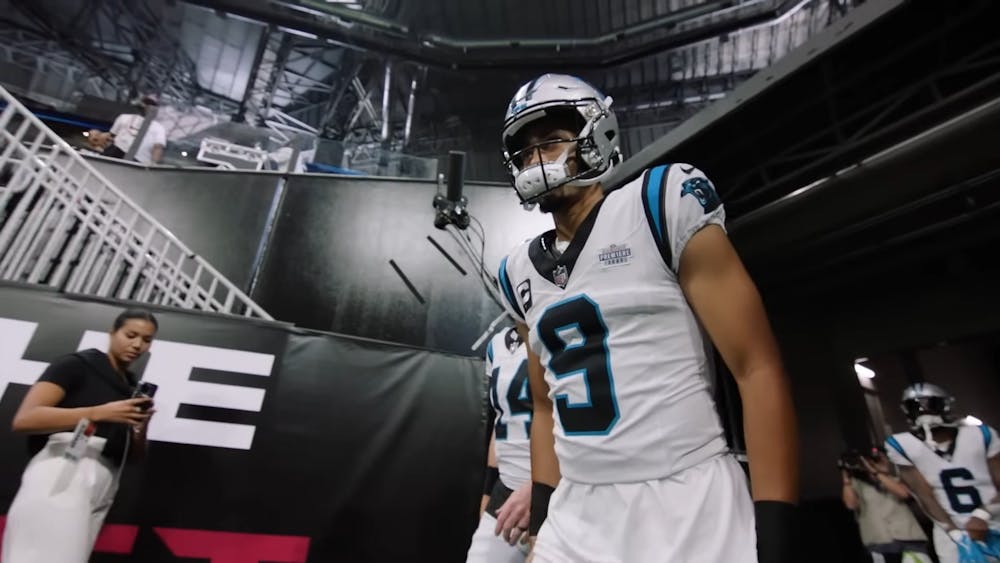In recent years, teams have rushed rookie quarterbacks in the NFL onto the field too early. Minnesota Vikings head coach Kevin O’Connell addressed this question on “The Rich Eisen Show,” stating, “I believe that organizations fail young quarterbacks before young quarterbacks fail organizations.”
What NFL team doesn’t like witnessing a highly-drafted prospective franchise quarterback proudly donning the team’s logo on draft night, stepping into center stage on the field, and being the one to lift the Vince Lombardi Trophy after winning the Super Bowl? Sadly, such dream scenarios are not common in the NFL today. In fact, many highly-drafted rookie quarterbacks fail to live up to their potential with stagnant or uninspiring careers. To some extent, it makes sense. If fresh talent is not utilized, it contradicts the idea of bringing new life to a team after drafting a whole new generation.
Rookie quarterbacks debuting in week one of their first season have become quite common in the modern era of football. No. 1 overall draft picks Joe Burrow of the Cincinnati Bengals in 2020 and Caleb Williams of the Chicago Bears this season are just two of many examples. Nevertheless, while some rookie quarterbacks are ready to be heroes, others like Zach Wilson of the Denver Broncos and Bryce Young of the Carolina Panthers seem to lack the same luck.
It is understandable for fans to stand in front of their television, frustrated when their highly-anticipated quarterback fails to meet expectations. Rather than be disappointed and immediately consider the next guy as a replacement, it is important for the team to take the player’s perspective and consider the underlying causes. Players, like us, differ in adaptability. Not every rookie quarterback can immediately hit the ground running like C.J. Stroud, who threw for 4,108 yards and 23 touchdowns last season, leading the underdog Houston Texans to their first playoff appearance since 2019. Similarly, Justin Herbert took over the starting quarterback position for the Los Angeles Chargers in week two of 2020, throwing for 4,336 yards and 31 touchdowns that season. On the other hand, in Wilson’s debut season for the Jets, he threw an underwhelming 2,334 yards and nine touchdowns.
Patience and an accurate assessment of the supporting cast are much more prudent and necessary for NFL teams than relying solely on a good quarterback to succeed. Does the team have a strong, deep receiver group to support him? Is the offensive line capable of providing the extra time that the rookie needs to adjust to the new environment? Transitioning from college football to the NFL is a massive leap, akin to moving from high school to college. Not only must players adapt to the environment and an NFL team’s style of play, but they also have to compete with a stronger pool of players, considering only 1.6% of college athletes make it to the professional level. Sounds intimidating, right?
It is undeniable that this leap creates unease for rookie quarterbacks, especially when facing players who are on multi-million dollar contracts and are bigger, stronger and faster. Therefore, before blaming rookie quarterbacks for their failure to hit the ground running in the NFL, it is necessary to evaluate the quarterback’s decision-making and skills. If a rookie is a “scramble around and make magic happen” quarterback like Johnny Manziel in college, it is very likely that he will not find his rhythm early on an NFL field since the professional defensive linemen are simply much faster. Instead, teams should look for fundamental skills such as innate talent, good footwork and high accuracy as a thrower when drafting quarterbacks.
A prime example of this patient approach is the Green Bay Packers’ starting quarterback, Jordan Love. Drafted in 2020, Love played his first full season in 2023, throwing for 4,159 yards and 32 touchdowns and leading his team to a dominant victory over the Super Bowl contenders Dallas Cowboys in the Wild Card round. It was a long road for Love, sitting behind Aaron Rodgers for three years — especially when Rodgers came off yet another Pro Bowl season at the age of 36 in the 2020 NFL season and showed no signs of slowing down. But Love learned from him, stacking mental and physical reps in practice to become the borderline elite quarterback he proved to be in 2023.
“Being on the bench for those three years, seeing a season, seeing how Aaron went about it, that's what got me to understand that stuff's not going to be perfect in the NFL,” Love told Sports Illustrated in August.
For each team, it is crucial to weigh the stakes. Instead of constantly drafting new quarterbacks every few years, signing a veteran or relying on an experienced player already on their roster can help develop rookies. A veteran can not only aid in a rookie’s adjustment to the NFL’s different style of gameplay but also supply them time to develop as people: strengthening physiques, learning the playbook and observing how seasoned players handle similar pressures.
So why do teams tend to throw rookie quarterbacks onto the field early on? The reasons are complex. Some take advantage of the salary cap when the quarterback is on a rookie deal, while others are eager to cease their losing streak carried over from the previous season. However, rushing rookie quarterbacks onto the field does not help their development. Instead, giving them time to mature and refine their skills is the best way to unlock their full potential. While it is understandable to roll early with new draft picks due to various incentives, prioritizing the long-term development of the team and the quarterback should be a better incentive for teams not to rush rookies, especially considering the potential long-term benefits of a stable and successful franchise.






